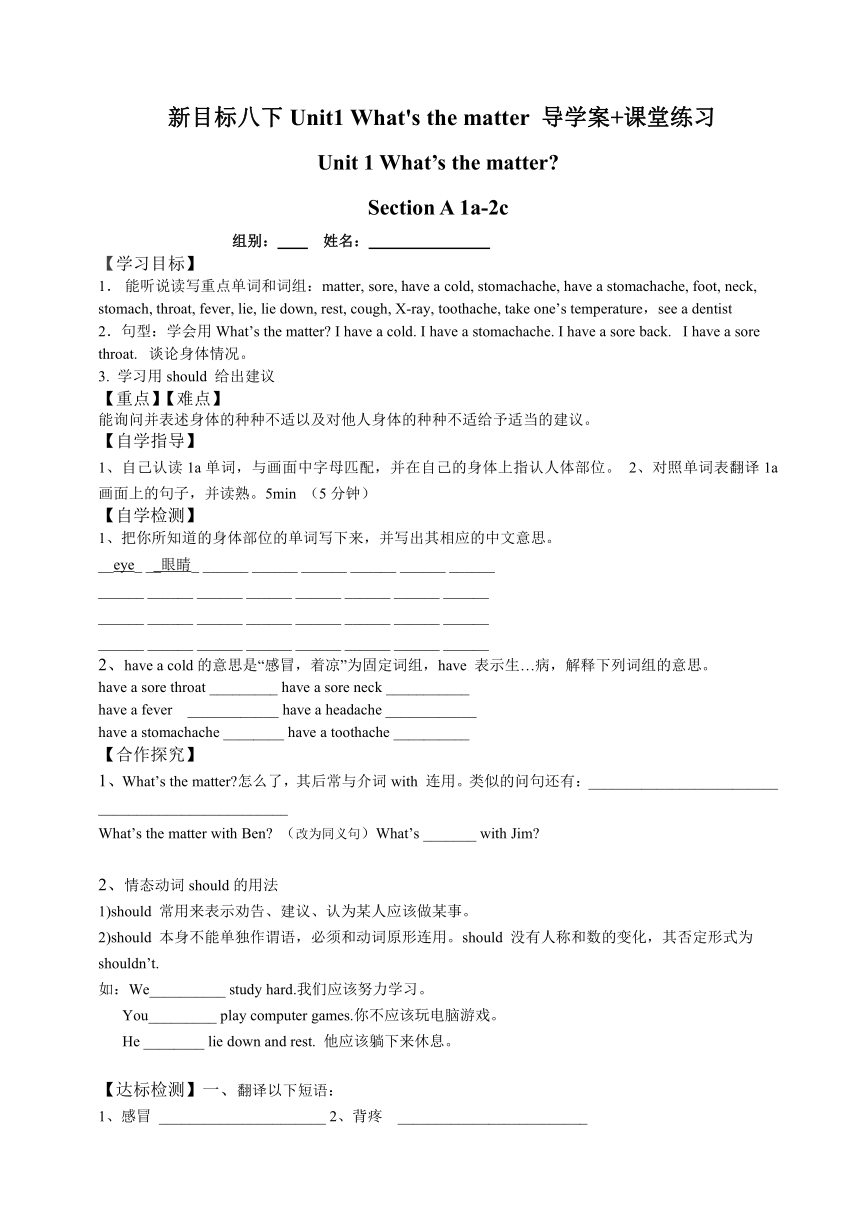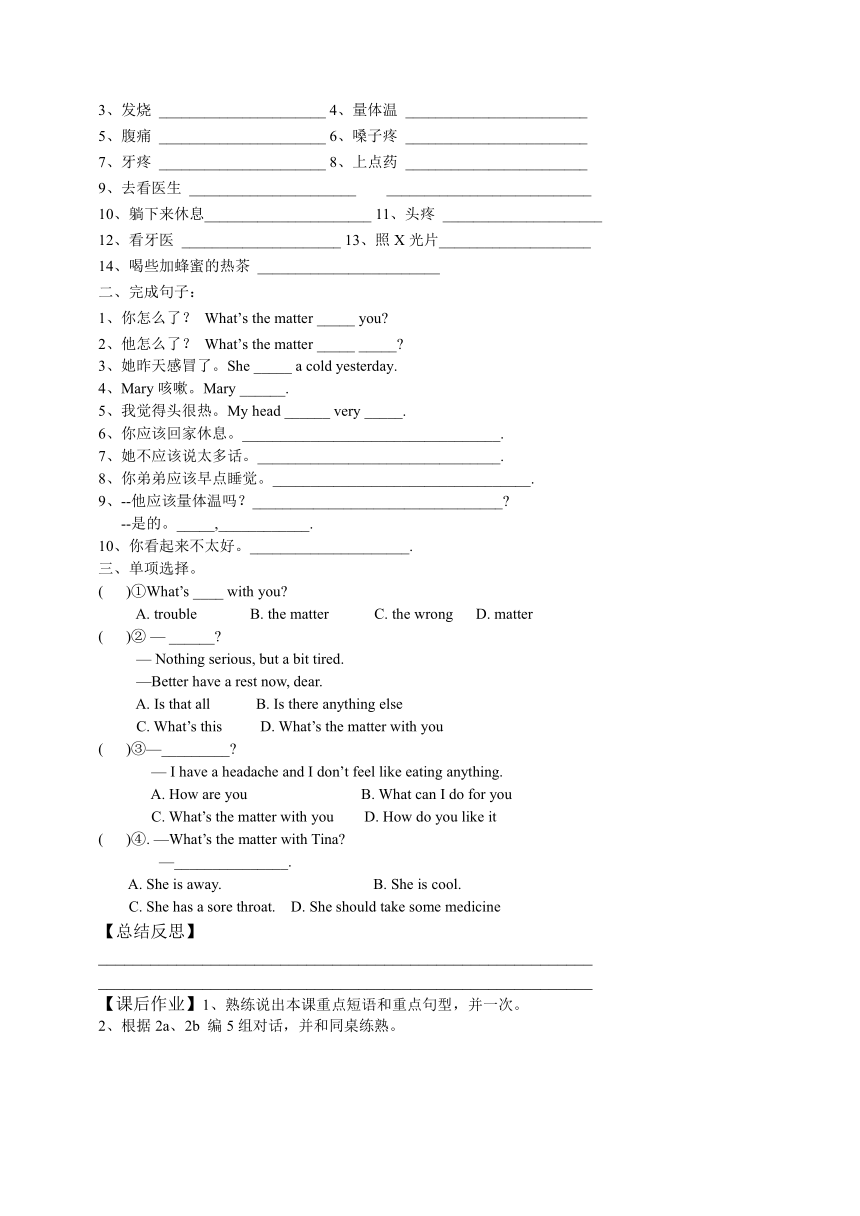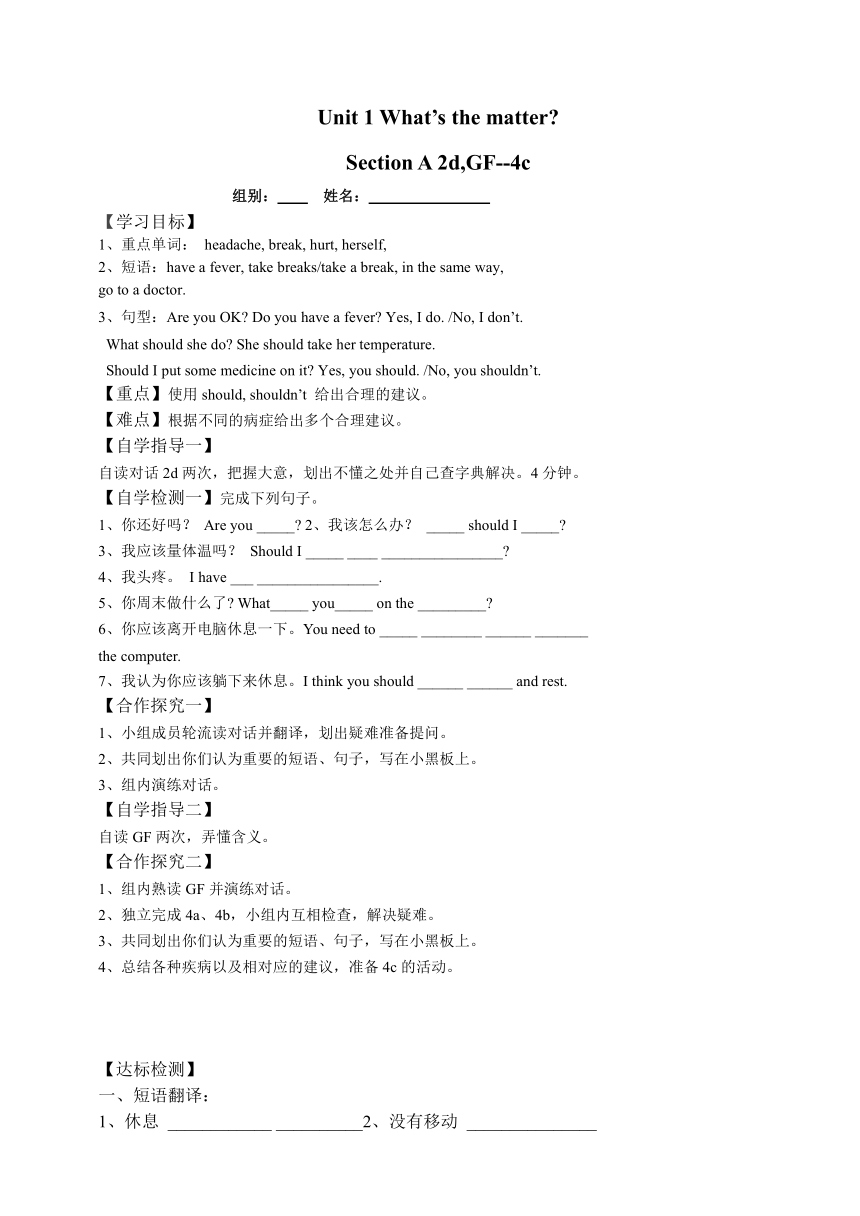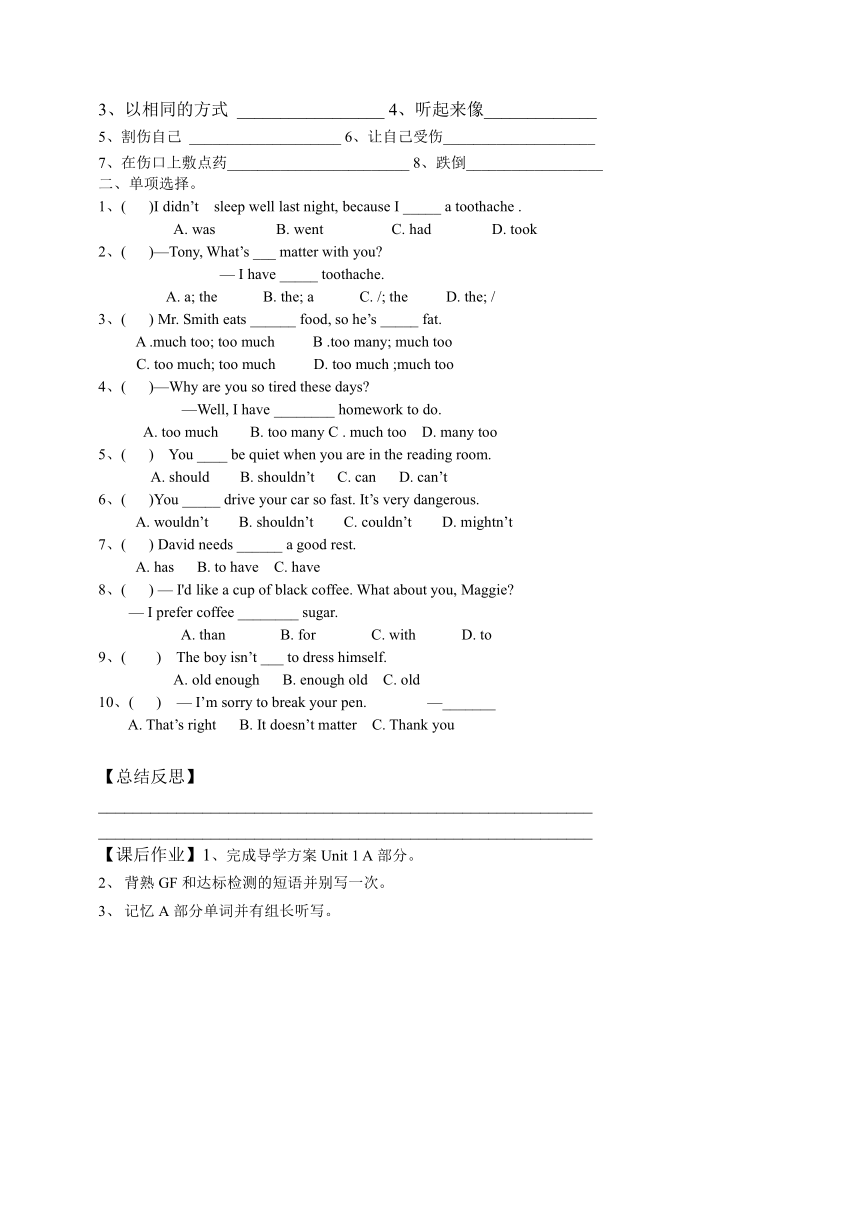新目标八下Unit1 What's the matter 导学案+课堂练习(无答案)
文档属性
| 名称 | 新目标八下Unit1 What's the matter 导学案+课堂练习(无答案) |  | |
| 格式 | zip | ||
| 文件大小 | 62.0KB | ||
| 资源类型 | 教案 | ||
| 版本资源 | 人教新目标(Go for it)版 | ||
| 科目 | 英语 | ||
| 更新时间 | 2020-04-02 14:10:38 | ||
图片预览




文档简介
新目标八下Unit1 What's the matter 导学案+课堂练习
Unit 1 What’s the matter?
Section A 1a-2c
组别: 姓名:
【学习目标】
1.?能听说读写重点单词和词组:matter, sore, have a cold, stomachache, have a stomachache, foot, neck, stomach, throat, fever, lie, lie down, rest, cough, X-ray, toothache, take one’s temperature,see a dentist
2.句型:学会用What’s the matter? I have a cold. I have a stomachache. I have a sore back.? I have a sore throat.? 谈论身体情况。
3. 学习用should 给出建议
【重点】【难点】
能询问并表述身体的种种不适以及对他人身体的种种不适给予适当的建议。
【自学指导】
1、自己认读1a单词,与画面中字母匹配,并在自己的身体上指认人体部位。 2、对照单词表翻译1a画面上的句子,并读熟。5min (5分钟)
【自学检测】
1、把你所知道的身体部位的单词写下来,并写出其相应的中文意思。
__eye_ __眼睛_ ______ ______ ______ ______ ______ ______
______ ______ ______ ______ ______ ______ ______ ______
______ ______ ______ ______ ______ ______ ______ ______
______ ______ ______ ______ ______ ______ ______ ______
2、have a cold的意思是“感冒,着凉”为固定词组,have 表示生…病,解释下列词组的意思。
have a sore throat _________ have a sore neck?___________????
have a fever?? ____________ have a headache ____________
have a stomachache ________?have a toothache __________
【合作探究】
1、What’s the matter?怎么了,其后常与介词with 连用。类似的问句还有:_________________________ _________________________
What’s the matter with Ben? (改为同义句)What’s _______ with Jim?
2、情态动词should的用法
1)should 常用来表示劝告、建议、认为某人应该做某事。
2)should 本身不能单独作谓语,必须和动词原形连用。should 没有人称和数的变化,其否定形式为shouldn’t.
如:We__________ study hard.我们应该努力学习。
You_________ play computer games.你不应该玩电脑游戏。
He ________ lie down and rest. 他应该躺下来休息。
【达标检测】一、翻译以下短语:
1、感冒 ______________________ 2、背疼 _________________________
3、发烧 ______________________ 4、量体温 ________________________
5、腹痛 ______________________ 6、嗓子疼 ________________________
7、牙疼 ______________________ 8、上点药 ________________________
9、去看医生 ______________________ ___________________________
10、躺下来休息______________________ 11、头疼 _____________________
12、看牙医 _____________________ 13、照X光片____________________
14、喝些加蜂蜜的热茶 ________________________
二、完成句子:
1、你怎么了? What’s the matter _____ you?
2、他怎么了? What’s the matter _____ _____?
3、她昨天感冒了。She _____ a cold yesterday.
4、Mary咳嗽。Mary ______.
5、我觉得头很热。My head ______ very _____.
6、你应该回家休息。__________________________________.
7、她不应该说太多话。________________________________.
8、你弟弟应该早点睡觉。__________________________________.
9、--他应该量体温吗?_________________________________?
--是的。_____,____________.
10、你看起来不太好。_____________________.
三、单项选择。
( )①What’s ____ with you?
A. trouble B. the matter C. the wrong D. matter
( )② — ______?
— Nothing serious, but a bit tired.
—Better have a rest now, dear.
A. Is that all B. Is there anything else
C. What’s this D. What’s the matter with you
( )③—_________?
— I have a headache and I don’t feel like eating anything.
A. How are you B. What can I do for you
C. What’s the matter with you D. How do you like it
( )④. —What’s the matter with Tina?
—_______________.
A. She is away. B. She is cool.
C. She has a sore throat. D. She should take some medicine
【总结反思】
_________________________________________________________
_________________________________________________________
【课后作业】1、熟练说出本课重点短语和重点句型,并一次。
2、根据2a、2b 编5组对话,并和同桌练熟。
Unit 1 What’s the matter?
Section A 2d,GF--4c
组别: 姓名:
【学习目标】
1、重点单词: headache, break, hurt, herself,
2、短语:have a fever, take breaks/take a break, in the same way,
go to a doctor.
3、句型:Are you OK? Do you have a fever? Yes, I do. /No, I don’t.
What should she do? She should take her temperature.
Should I put some medicine on it? Yes, you should. /No, you shouldn’t.
【重点】使用should, shouldn’t 给出合理的建议。
【难点】根据不同的病症给出多个合理建议。
【自学指导一】
自读对话2d两次,把握大意,划出不懂之处并自己查字典解决。4分钟。
【自学检测一】完成下列句子。
1、你还好吗? Are you _____? 2、我该怎么办? _____ should I _____?
3、我应该量体温吗? Should I _____ ____ ________________?
4、我头疼。 I have ___ ________________.
5、你周末做什么了? What_____ you_____ on the _________?
6、你应该离开电脑休息一下。You need to _____ ________ ______ _______
the computer.
7、我认为你应该躺下来休息。I think you should ______ ______ and rest.
【合作探究一】
1、小组成员轮流读对话并翻译,划出疑难准备提问。
2、共同划出你们认为重要的短语、句子,写在小黑板上。
3、组内演练对话。
【自学指导二】
自读GF两次,弄懂含义。
【合作探究二】
1、组内熟读GF并演练对话。
2、独立完成4a、4b,小组内互相检查,解决疑难。
3、共同划出你们认为重要的短语、句子,写在小黑板上。
4、总结各种疾病以及相对应的建议,准备4c的活动。
【达标检测】
短语翻译:
休息 ____________ __________2、没有移动 _______________
3、以相同的方式 _________________ 4、听起来像_____________
5、割伤自己 ____________________ 6、让自己受伤____________________
7、在伤口上敷点药________________________ 8、跌倒__________________
二、单项选择。
1、( )I didn’t sleep well last night, because I _____ a toothache .
A. was B. went C. had D. took
2、( )—Tony, What’s ___ matter with you?
— I have _____ toothache.
A. a; the B. the; a C. /; the D. the; /
3、( ) Mr. Smith eats ______ food, so he’s _____ fat.
A .much too; too much B .too many; much too
C. too much; too much D. too much ;much too
4、( )—Why are you so tired these days?
—Well, I have ________ homework to do.
A. too much B. too many C . much too D. many too
5、( ) You ____ be quiet when you are in the reading room.
A. should B. shouldn’t C. can D. can’t
6、( )You _____ drive your car so fast. It’s very dangerous.
A. wouldn’t B. shouldn’t C. couldn’t D. mightn’t
7、( ) David needs ______ a good rest.
A. has B. to have C. have
8、( ) — I'd like a cup of black coffee. What about you, Maggie?
— I prefer coffee ________ sugar.
A. than B. for C. with D. to
9、( ) The boy isn’t ___ to dress himself.
A. old enough B. enough old C. old
10、( ) — I’m sorry to break your pen. —_______
A. That’s right B. It doesn’t matter C. Thank you
【总结反思】
_________________________________________________________
_________________________________________________________
【课后作业】1、完成导学方案Unit 1 A部分。
背熟GF和达标检测的短语并别写一次。
记忆A部分单词并有组长听写。
Unit1 What’s the matter?
Section A 3a—3c
组别: 姓名:
【学习目标】
1、能听说读写重点单词和短语:passenger, off, get off, to one’s surprise onto, trouble, hit, right away, get into
2、能够熟读文章。
【重点难点】会运用重要短语
【自学指导】1、自读文章2次,把握文章大意。2、划出重点短语和句子。3、划出不懂的地方准备小组讨论。
【自学检测】
1、小组成员轮流翻译句子。
2、独立完成3b,小组检查,小组讨论3c。
3、小组合作总结重点短语并写在小黑板上。
【合作探究】
1、see (saw , seen) v 看见
see sb. do sth 看见某人做某事 (看到动作发生的全过程或经常看到动作发生)
see sb. doing sth 看见某人正在做某事 (强调动作正在发生)
2、He got off and asked the woman what happened.
他下车问那名妇女发生了什么事。
【解析】get off 下车 (反) get on 上车
【拓展】与get相关的短语:
get up起床 get back回来;取回 get over克服;度过
get on/along well with与……相处融洽 get to到达
3、But to his surprise, they all agreed to go with him.
但令他吃惊的是,所有的乘客都同意和他一起去医院。
【解析】surprise [s?'pra?z] ⑴v 使吃惊→surprising adj. 令人吃惊的
→surprised adj. 吃惊的
surprise sb 使某人吃惊 The bad news surprised me.
be surprised at 对……感到吃惊
be surprised to do sth 做某事而感到惊讶
be surprised + that从句 因...而惊讶
Surprise ⑵ n 惊讶”
to one’s surprise 使某人吃惊的是
in surprise 吃惊地
①__________________(使我吃惊的是),he got the first prize in the exam.
②We are__________ at the___________ news. (surprise)
( ) ③ ___his surprise, she succeeded in climbing up the high mountain.
A. At B. To C. In D. On
【解析2】agree v→ (反)disagree – agreement n同意
(1) agree with sb. 同意某人 I agree with you.
(2)agree to do sth 同意做某事
①— Do you agree with him?
— No, I ___________ (agree ) with him.
( ) ②—I think English is more useful than Chinese.
—I don’t ____ you. They are both useful.
A. get on with B. catch up with C. talk with D. agree with
4、Thanks to Mr. Wang and the passengers , the doctor saved the man in time.
多亏了王先生和乘客的帮助, 医生及时挽救了那位老人的生命。
【解析1】 thanks to 对亏;由于
⑴thanks to为习语介词,thanks不可以改为thank you (?http:?/??/?zhidao.baidu.com?/?search?word=thank%20you&fr=qb_search_exp&ie=utf8?),to后也不接动词原形 (?http:?/??/?zhidao.baidu.com?/?search?word=动词原形&fr=qb_search_exp&ie=utf8?), 这个短语表示原因,意为“由于”、“多亏”,to表示感谢的对象
⑵ thanks for ,意为“因……而感谢”,for强调为何而感谢,其后可接名词或v-ing, thanks相当于 thank you (?http:?/??/?zhidao.baidu.com?/?search?word=thank%20you&fr=qb_search_exp&ie=utf8?)
_______ the teacher, I’ve made great progress.
A. Thank you B. Thanks C. Thanks lot
【解析2】on time 准时/in time 及时
on time= at exactly the right time. 准时(在规定的时间之内) 强调与某个时刻一致
In time= with enough time to spare/ not late 及时(恰在时间点上) 表示动作在规定时间内或比规定时间提前发生
【记】She didn’t catch the ___________, so she couldn’t arrive there __________.
【短语】at times=sometimes 有时 have a good time 玩得高兴
have time =be free 有空 all the time 一直
at the same time 同时 by the time 到……时候
for the first time 第一次
【句型】 It’s time to do sth =It’s time for sth 是该做某事的时间了
It takes sb. some time to do sth 做某事花费某人多长时间s
①【湖北岳阳】I knew it was impossible for me _______________.
(按时上班)
② We must ___ ____ _____ for class. (按时上课)
5、Do you agree that people often do not help others because they do not want to get into trouble?
人们常常不去帮助别人是因为他们不想惹麻烦。
【解析】trouble/'tr?bl/n .问题;苦恼
get into trouble造成麻烦(或烦恼)
be in trouble 处于困境中
have trouble (in) doing sth做某事有困难
(练习)That is a monkey on his back. Let’s help him.
A. He has a monkey B. He likes playing with the monky
C. He is in trouble D. He is good at studying
【达标检测】一、翻译短语:
1、在马路边_____________________ 2、大声呼救___________________
3、没有多想_______________ 4、有心脏病 ________________________
5、多亏_____________ 6、下车_____________ 7、及时_______________
8、挽救生命___________________ 9、陷入麻烦______________________
二、翻译句子:1、司机看到一位老人躺在马路边。
2、24岁的司机王平,没有多想就停下了车。
3、据说很多人不想帮助别人,因为他们不想有任何麻烦。
三、( ) 1、Seeing their teacher ___ into the classroom, they stopped ___ at once.
A. walk; telling B. entering; to speak
C. enter; to tell D. walking; talking
( ) 2、 —So many problems! I’m tired.
—You should try to them by yourself. You are not a child any longer.
A. get into B. get off C. get on D. get over
( )3、 If Ted can _______ his difficulties, he’ll make great progress.
come over B. get over C. get off D. come out ( )
4、The fans were ____ to know the death of their favorite singing star Whitney Huston.
A. glad B. angry C. excited D. surprised
( )5、I got home for my birthday from my college on Friday evening. No one was at home, and Mom and Dad hadn’t left me a note. This made me _________.
A. surprised B. happy C. angry D. excited
( )6、Tom didn’t go to school _____ this morning because he overslept.
A. at once B. on time C. by accident D. at present
( )7、The teacher hope all of us can hand ____ our homework ____ time every day.
A. up ; in B. out; on C. on; in D. in ; on
( )8、_____ her husband,she has now become a famous film star.
A. Because B. Thanks to C. Thanks for D. With the help
【总结反思】这节课你学到了什么,还有什么疑问?
【课后作业】
完成练案A2,组织听写单词短语。
Unit 1 What’s the matter?
Section B
组别: 姓名:
【学习目标】
1、能听说读bandage, nosebleed。能听说读写sick, knee, feel sick, have a nosebleed 等重要短语。
2、能使用更多的语言描述问题并提出建议。
【重点】会说重点短语
【难点】能运用更丰富的语言描述遇到的问题;提出有针对性的建议
【自学指导】
自己读1a、1c短语并查出意思。
读1b短句并查出意思。
小组合作把重点短语短句展示在黑板上,重要单词下划线。
【自学检测】
1、描述已经发生的事情,常用_____时态。
2、写出以下动词的过去式:
feel_____ cut_____ hurt_____ have_____ get_____
put_____ take_____ tell_____ come_____ run_____
3、写出1b中的6种疾病或问题:
______________________ _____________________
______________________ _____________________
______________________ _____________________
【自主合作】
听力练习1b,小组检查核对。
听力练习1c,小组核对答案。
小组编对话。
【合作探究】
1、Someone felt sick. 有人生病了。
【解析】feel sick 生病;不舒服
sick /ill adj. 生病的
(1) sick adj.“生病的”,既可放be (系动词)后作表语,也可放n.前作定语。
be sick of …“讨厌;厌恶……” sick person = patient“病人”
(2) ill adj.“生病的”,只能放be (系动词)后作表语,
be ill in hospital 生病住院 ill → illness n.“病;疾病”
①I think her (ill) is very serious. 我认为她的病是很严重。
( ) ②The ___ girl was sent to hospital by her mother yesterday.
A. sick B. ill C. good D. well
2、【解析】hit/hit/v. (hit/hit/)( 用手或器具)击;打
hit sb. 击中/撞到某人 The ball hit him in the face.
“击中某人某个部位”可以用 “ hit sb. in/on the +部位”
hit n. 打,击 Give it a good hit. 用力打它一下。
get hit on the head. 撞到头了/头部受到撞击了
【达标检测】
翻译短语
1、休息几天_____________ 2、用绷带包扎______________
3、穿上干净的T恤______________4、觉得恶心_________
5、流鼻血_______________6、撞到了头_____________________
7、割伤膝盖______________ 8、用水冲______________
9、把头向后仰______________ 10、让他休息______________
二、根据以下问题给出建议:
1、——I cut my finger, what should I do?
——
2、——He had a nosebleed, what should he do?
——
3、——My sister got hit on her head, what should I do?
——
三、根据要求完成句子。
1、Jenny felt sick.(对画线部分提问)
Jenny ??
2、His friend took him to Beijing to have a music festival.(改为否定句)
His friend him to Beijing to have a music festival.?
3、I hurt myself cutting up meat.(改为一般疑问句,并作否定回答)
you cutting up meat??
,I .?
【总结反思】
【课后作业】
完成练案unit 1 B1a-1d。
Unit 1 What’s the matter?
Section A 1a-2c
组别: 姓名:
【学习目标】
1.?能听说读写重点单词和词组:matter, sore, have a cold, stomachache, have a stomachache, foot, neck, stomach, throat, fever, lie, lie down, rest, cough, X-ray, toothache, take one’s temperature,see a dentist
2.句型:学会用What’s the matter? I have a cold. I have a stomachache. I have a sore back.? I have a sore throat.? 谈论身体情况。
3. 学习用should 给出建议
【重点】【难点】
能询问并表述身体的种种不适以及对他人身体的种种不适给予适当的建议。
【自学指导】
1、自己认读1a单词,与画面中字母匹配,并在自己的身体上指认人体部位。 2、对照单词表翻译1a画面上的句子,并读熟。5min (5分钟)
【自学检测】
1、把你所知道的身体部位的单词写下来,并写出其相应的中文意思。
__eye_ __眼睛_ ______ ______ ______ ______ ______ ______
______ ______ ______ ______ ______ ______ ______ ______
______ ______ ______ ______ ______ ______ ______ ______
______ ______ ______ ______ ______ ______ ______ ______
2、have a cold的意思是“感冒,着凉”为固定词组,have 表示生…病,解释下列词组的意思。
have a sore throat _________ have a sore neck?___________????
have a fever?? ____________ have a headache ____________
have a stomachache ________?have a toothache __________
【合作探究】
1、What’s the matter?怎么了,其后常与介词with 连用。类似的问句还有:_________________________ _________________________
What’s the matter with Ben? (改为同义句)What’s _______ with Jim?
2、情态动词should的用法
1)should 常用来表示劝告、建议、认为某人应该做某事。
2)should 本身不能单独作谓语,必须和动词原形连用。should 没有人称和数的变化,其否定形式为shouldn’t.
如:We__________ study hard.我们应该努力学习。
You_________ play computer games.你不应该玩电脑游戏。
He ________ lie down and rest. 他应该躺下来休息。
【达标检测】一、翻译以下短语:
1、感冒 ______________________ 2、背疼 _________________________
3、发烧 ______________________ 4、量体温 ________________________
5、腹痛 ______________________ 6、嗓子疼 ________________________
7、牙疼 ______________________ 8、上点药 ________________________
9、去看医生 ______________________ ___________________________
10、躺下来休息______________________ 11、头疼 _____________________
12、看牙医 _____________________ 13、照X光片____________________
14、喝些加蜂蜜的热茶 ________________________
二、完成句子:
1、你怎么了? What’s the matter _____ you?
2、他怎么了? What’s the matter _____ _____?
3、她昨天感冒了。She _____ a cold yesterday.
4、Mary咳嗽。Mary ______.
5、我觉得头很热。My head ______ very _____.
6、你应该回家休息。__________________________________.
7、她不应该说太多话。________________________________.
8、你弟弟应该早点睡觉。__________________________________.
9、--他应该量体温吗?_________________________________?
--是的。_____,____________.
10、你看起来不太好。_____________________.
三、单项选择。
( )①What’s ____ with you?
A. trouble B. the matter C. the wrong D. matter
( )② — ______?
— Nothing serious, but a bit tired.
—Better have a rest now, dear.
A. Is that all B. Is there anything else
C. What’s this D. What’s the matter with you
( )③—_________?
— I have a headache and I don’t feel like eating anything.
A. How are you B. What can I do for you
C. What’s the matter with you D. How do you like it
( )④. —What’s the matter with Tina?
—_______________.
A. She is away. B. She is cool.
C. She has a sore throat. D. She should take some medicine
【总结反思】
_________________________________________________________
_________________________________________________________
【课后作业】1、熟练说出本课重点短语和重点句型,并一次。
2、根据2a、2b 编5组对话,并和同桌练熟。
Unit 1 What’s the matter?
Section A 2d,GF--4c
组别: 姓名:
【学习目标】
1、重点单词: headache, break, hurt, herself,
2、短语:have a fever, take breaks/take a break, in the same way,
go to a doctor.
3、句型:Are you OK? Do you have a fever? Yes, I do. /No, I don’t.
What should she do? She should take her temperature.
Should I put some medicine on it? Yes, you should. /No, you shouldn’t.
【重点】使用should, shouldn’t 给出合理的建议。
【难点】根据不同的病症给出多个合理建议。
【自学指导一】
自读对话2d两次,把握大意,划出不懂之处并自己查字典解决。4分钟。
【自学检测一】完成下列句子。
1、你还好吗? Are you _____? 2、我该怎么办? _____ should I _____?
3、我应该量体温吗? Should I _____ ____ ________________?
4、我头疼。 I have ___ ________________.
5、你周末做什么了? What_____ you_____ on the _________?
6、你应该离开电脑休息一下。You need to _____ ________ ______ _______
the computer.
7、我认为你应该躺下来休息。I think you should ______ ______ and rest.
【合作探究一】
1、小组成员轮流读对话并翻译,划出疑难准备提问。
2、共同划出你们认为重要的短语、句子,写在小黑板上。
3、组内演练对话。
【自学指导二】
自读GF两次,弄懂含义。
【合作探究二】
1、组内熟读GF并演练对话。
2、独立完成4a、4b,小组内互相检查,解决疑难。
3、共同划出你们认为重要的短语、句子,写在小黑板上。
4、总结各种疾病以及相对应的建议,准备4c的活动。
【达标检测】
短语翻译:
休息 ____________ __________2、没有移动 _______________
3、以相同的方式 _________________ 4、听起来像_____________
5、割伤自己 ____________________ 6、让自己受伤____________________
7、在伤口上敷点药________________________ 8、跌倒__________________
二、单项选择。
1、( )I didn’t sleep well last night, because I _____ a toothache .
A. was B. went C. had D. took
2、( )—Tony, What’s ___ matter with you?
— I have _____ toothache.
A. a; the B. the; a C. /; the D. the; /
3、( ) Mr. Smith eats ______ food, so he’s _____ fat.
A .much too; too much B .too many; much too
C. too much; too much D. too much ;much too
4、( )—Why are you so tired these days?
—Well, I have ________ homework to do.
A. too much B. too many C . much too D. many too
5、( ) You ____ be quiet when you are in the reading room.
A. should B. shouldn’t C. can D. can’t
6、( )You _____ drive your car so fast. It’s very dangerous.
A. wouldn’t B. shouldn’t C. couldn’t D. mightn’t
7、( ) David needs ______ a good rest.
A. has B. to have C. have
8、( ) — I'd like a cup of black coffee. What about you, Maggie?
— I prefer coffee ________ sugar.
A. than B. for C. with D. to
9、( ) The boy isn’t ___ to dress himself.
A. old enough B. enough old C. old
10、( ) — I’m sorry to break your pen. —_______
A. That’s right B. It doesn’t matter C. Thank you
【总结反思】
_________________________________________________________
_________________________________________________________
【课后作业】1、完成导学方案Unit 1 A部分。
背熟GF和达标检测的短语并别写一次。
记忆A部分单词并有组长听写。
Unit1 What’s the matter?
Section A 3a—3c
组别: 姓名:
【学习目标】
1、能听说读写重点单词和短语:passenger, off, get off, to one’s surprise onto, trouble, hit, right away, get into
2、能够熟读文章。
【重点难点】会运用重要短语
【自学指导】1、自读文章2次,把握文章大意。2、划出重点短语和句子。3、划出不懂的地方准备小组讨论。
【自学检测】
1、小组成员轮流翻译句子。
2、独立完成3b,小组检查,小组讨论3c。
3、小组合作总结重点短语并写在小黑板上。
【合作探究】
1、see (saw , seen) v 看见
see sb. do sth 看见某人做某事 (看到动作发生的全过程或经常看到动作发生)
see sb. doing sth 看见某人正在做某事 (强调动作正在发生)
2、He got off and asked the woman what happened.
他下车问那名妇女发生了什么事。
【解析】get off 下车 (反) get on 上车
【拓展】与get相关的短语:
get up起床 get back回来;取回 get over克服;度过
get on/along well with与……相处融洽 get to到达
3、But to his surprise, they all agreed to go with him.
但令他吃惊的是,所有的乘客都同意和他一起去医院。
【解析】surprise [s?'pra?z] ⑴v 使吃惊→surprising adj. 令人吃惊的
→surprised adj. 吃惊的
surprise sb 使某人吃惊 The bad news surprised me.
be surprised at 对……感到吃惊
be surprised to do sth 做某事而感到惊讶
be surprised + that从句 因...而惊讶
Surprise ⑵ n 惊讶”
to one’s surprise 使某人吃惊的是
in surprise 吃惊地
①__________________(使我吃惊的是),he got the first prize in the exam.
②We are__________ at the___________ news. (surprise)
( ) ③ ___his surprise, she succeeded in climbing up the high mountain.
A. At B. To C. In D. On
【解析2】agree v→ (反)disagree – agreement n同意
(1) agree with sb. 同意某人 I agree with you.
(2)agree to do sth 同意做某事
①— Do you agree with him?
— No, I ___________ (agree ) with him.
( ) ②—I think English is more useful than Chinese.
—I don’t ____ you. They are both useful.
A. get on with B. catch up with C. talk with D. agree with
4、Thanks to Mr. Wang and the passengers , the doctor saved the man in time.
多亏了王先生和乘客的帮助, 医生及时挽救了那位老人的生命。
【解析1】 thanks to 对亏;由于
⑴thanks to为习语介词,thanks不可以改为thank you (?http:?/??/?zhidao.baidu.com?/?search?word=thank%20you&fr=qb_search_exp&ie=utf8?),to后也不接动词原形 (?http:?/??/?zhidao.baidu.com?/?search?word=动词原形&fr=qb_search_exp&ie=utf8?), 这个短语表示原因,意为“由于”、“多亏”,to表示感谢的对象
⑵ thanks for ,意为“因……而感谢”,for强调为何而感谢,其后可接名词或v-ing, thanks相当于 thank you (?http:?/??/?zhidao.baidu.com?/?search?word=thank%20you&fr=qb_search_exp&ie=utf8?)
_______ the teacher, I’ve made great progress.
A. Thank you B. Thanks C. Thanks lot
【解析2】on time 准时/in time 及时
on time= at exactly the right time. 准时(在规定的时间之内) 强调与某个时刻一致
In time= with enough time to spare/ not late 及时(恰在时间点上) 表示动作在规定时间内或比规定时间提前发生
【记】She didn’t catch the ___________, so she couldn’t arrive there __________.
【短语】at times=sometimes 有时 have a good time 玩得高兴
have time =be free 有空 all the time 一直
at the same time 同时 by the time 到……时候
for the first time 第一次
【句型】 It’s time to do sth =It’s time for sth 是该做某事的时间了
It takes sb. some time to do sth 做某事花费某人多长时间s
①【湖北岳阳】I knew it was impossible for me _______________.
(按时上班)
② We must ___ ____ _____ for class. (按时上课)
5、Do you agree that people often do not help others because they do not want to get into trouble?
人们常常不去帮助别人是因为他们不想惹麻烦。
【解析】trouble/'tr?bl/n .问题;苦恼
get into trouble造成麻烦(或烦恼)
be in trouble 处于困境中
have trouble (in) doing sth做某事有困难
(练习)That is a monkey on his back. Let’s help him.
A. He has a monkey B. He likes playing with the monky
C. He is in trouble D. He is good at studying
【达标检测】一、翻译短语:
1、在马路边_____________________ 2、大声呼救___________________
3、没有多想_______________ 4、有心脏病 ________________________
5、多亏_____________ 6、下车_____________ 7、及时_______________
8、挽救生命___________________ 9、陷入麻烦______________________
二、翻译句子:1、司机看到一位老人躺在马路边。
2、24岁的司机王平,没有多想就停下了车。
3、据说很多人不想帮助别人,因为他们不想有任何麻烦。
三、( ) 1、Seeing their teacher ___ into the classroom, they stopped ___ at once.
A. walk; telling B. entering; to speak
C. enter; to tell D. walking; talking
( ) 2、 —So many problems! I’m tired.
—You should try to them by yourself. You are not a child any longer.
A. get into B. get off C. get on D. get over
( )3、 If Ted can _______ his difficulties, he’ll make great progress.
come over B. get over C. get off D. come out ( )
4、The fans were ____ to know the death of their favorite singing star Whitney Huston.
A. glad B. angry C. excited D. surprised
( )5、I got home for my birthday from my college on Friday evening. No one was at home, and Mom and Dad hadn’t left me a note. This made me _________.
A. surprised B. happy C. angry D. excited
( )6、Tom didn’t go to school _____ this morning because he overslept.
A. at once B. on time C. by accident D. at present
( )7、The teacher hope all of us can hand ____ our homework ____ time every day.
A. up ; in B. out; on C. on; in D. in ; on
( )8、_____ her husband,she has now become a famous film star.
A. Because B. Thanks to C. Thanks for D. With the help
【总结反思】这节课你学到了什么,还有什么疑问?
【课后作业】
完成练案A2,组织听写单词短语。
Unit 1 What’s the matter?
Section B
组别: 姓名:
【学习目标】
1、能听说读bandage, nosebleed。能听说读写sick, knee, feel sick, have a nosebleed 等重要短语。
2、能使用更多的语言描述问题并提出建议。
【重点】会说重点短语
【难点】能运用更丰富的语言描述遇到的问题;提出有针对性的建议
【自学指导】
自己读1a、1c短语并查出意思。
读1b短句并查出意思。
小组合作把重点短语短句展示在黑板上,重要单词下划线。
【自学检测】
1、描述已经发生的事情,常用_____时态。
2、写出以下动词的过去式:
feel_____ cut_____ hurt_____ have_____ get_____
put_____ take_____ tell_____ come_____ run_____
3、写出1b中的6种疾病或问题:
______________________ _____________________
______________________ _____________________
______________________ _____________________
【自主合作】
听力练习1b,小组检查核对。
听力练习1c,小组核对答案。
小组编对话。
【合作探究】
1、Someone felt sick. 有人生病了。
【解析】feel sick 生病;不舒服
sick /ill adj. 生病的
(1) sick adj.“生病的”,既可放be (系动词)后作表语,也可放n.前作定语。
be sick of …“讨厌;厌恶……” sick person = patient“病人”
(2) ill adj.“生病的”,只能放be (系动词)后作表语,
be ill in hospital 生病住院 ill → illness n.“病;疾病”
①I think her (ill) is very serious. 我认为她的病是很严重。
( ) ②The ___ girl was sent to hospital by her mother yesterday.
A. sick B. ill C. good D. well
2、【解析】hit/hit/v. (hit/hit/)( 用手或器具)击;打
hit sb. 击中/撞到某人 The ball hit him in the face.
“击中某人某个部位”可以用 “ hit sb. in/on the +部位”
hit n. 打,击 Give it a good hit. 用力打它一下。
get hit on the head. 撞到头了/头部受到撞击了
【达标检测】
翻译短语
1、休息几天_____________ 2、用绷带包扎______________
3、穿上干净的T恤______________4、觉得恶心_________
5、流鼻血_______________6、撞到了头_____________________
7、割伤膝盖______________ 8、用水冲______________
9、把头向后仰______________ 10、让他休息______________
二、根据以下问题给出建议:
1、——I cut my finger, what should I do?
——
2、——He had a nosebleed, what should he do?
——
3、——My sister got hit on her head, what should I do?
——
三、根据要求完成句子。
1、Jenny felt sick.(对画线部分提问)
Jenny ??
2、His friend took him to Beijing to have a music festival.(改为否定句)
His friend him to Beijing to have a music festival.?
3、I hurt myself cutting up meat.(改为一般疑问句,并作否定回答)
you cutting up meat??
,I .?
【总结反思】
【课后作业】
完成练案unit 1 B1a-1d。
同课章节目录
- Unit 1 What's the matter?
- Section A
- Section B
- Unit 2 I'll help to clean up the city parks.
- Section A
- Section B
- Unit 3 Could you please clean your room?
- Section A
- Section B
- Unit 4 Why don't you talk to your parents?
- Section A
- Section B
- Unit 5 What were you doing when the rainstorm came
- Section A
- Section B
- Review of Units 1-5
- Unit 6 An old man tried to move the mountains.
- Section A
- Section B
- Unit 7 What's the highest mountain in the world?
- Section A
- Section B
- Unit 8 Have you read Treasure Island yet?
- Section A
- Section B
- Unit 9 Have you ever been to a museum?
- Section A
- Section B
- Unit 10 I've had this bike for three years.
- Section A
- Section B
